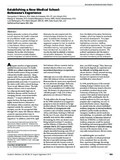Please use this identifier to cite or link to this item:
http://hdl.handle.net/10311/1242Full metadata record
| DC Field | Value | Language |
|---|---|---|
| dc.contributor.author | Mokone, Gaonyadiwe G. | - |
| dc.contributor.author | Kebaetse, Maikutlo | - |
| dc.contributor.author | Wright, John | - |
| dc.contributor.author | Kebaetse, Masego B. | - |
| dc.contributor.author | Makgabana-Dintwa, Oarabile | - |
| dc.contributor.author | Kebaabetswe, Poloko | - |
| dc.contributor.author | Badlangana, Ludo | - |
| dc.contributor.author | Mogodi, Mpho | - |
| dc.contributor.author | Bryant, Katie | - |
| dc.contributor.author | Nkomazana, Oathokwa | - |
| dc.date.accessioned | 2014-09-10T08:26:15Z | - |
| dc.date.available | 2014-09-10T08:26:15Z | - |
| dc.date.issued | 2014-08 | - |
| dc.identifier.citation | Mokone, Gaonyadiwe G. et al (2014) Establishing a new medical school: Botswana’s experience, Academic Medicine, Journal of the Association of American Medical Colleges, Vol. 89, No. 1, pp S83-S87 | en_US |
| dc.identifier.issn | 1938-808X (online) | - |
| dc.identifier.uri | http://hdl.handle.net/10311/1242 | - |
| dc.description.abstract | Having adequate numbers of qualified human resources for health is essential for any effective health care system. However, there is a global shortage of skilled health care workers, especially in Sub-Saharan African countries. This shortage is exacerbated by a disproportionately high rate of infectious diseases, the burden of emerging chronic, noncommunicable diseases, and the emigration of medical doctors. Botswana has also experienced this critical shortage of doctors for many years. To address the shortage, the country in the 1990s embarked on an aggressive program to train its students at foreign medical schools. Despite intensified training, many graduates have not returned. As a result, the country decided to establish a medical school within Botswana. The newly established school was awarded a grant from the Medical Education Partnership Initiative, which has helped to accelerate the school’s development. This paper describes the authors’ experiences, highlighting curriculum, staffing, infrastructure approaches, key successes, and challenges encountered. The paper concludes by proposing solutions. The authors’ experiences and the lessons learned can inform colleagues in other countries considering similar endeavors. | en_US |
| dc.language.iso | en | en_US |
| dc.publisher | Academic Medicine, http://journals.lww.com/AcademicMedicine/pages/default.aspx | en_US |
| dc.relation.ispartofseries | Innovation and Implementation Reports; | - |
| dc.subject | Medical education | en_US |
| dc.subject | Human resources for health | en_US |
| dc.subject | Physicians | en_US |
| dc.subject | School of Medicine | en_US |
| dc.subject | University of Botswana | en_US |
| dc.subject | Curriculum | en_US |
| dc.subject | Infrastructure | en_US |
| dc.subject | Medical Education Partnership Initiative (MEPI) | en_US |
| dc.subject.lcsh | Botswana | en_US |
| dc.title | Establishing a new medical school: Botswana’s experience | en_US |
| dc.type | Published Article | en_US |
| dc.rights.holder | © 2014 by the Association of American Medical Colleges | en_US |
| dc.link | http://journals.lww.com/academicmedicine/Fulltext/2014/08001/Establishing_a_New_Medical_School___Botswana_s.22.aspx | en_US |
| Appears in Collections: | Research articles (School of Medicine) | |
Files in This Item:
| File | Description | Size | Format | |
|---|---|---|---|---|
| Establishing_a_New_Medical_School___Botswana_s.22.pdf | 320.51 kB | Adobe PDF |  View/Open |
Items in DSpace are protected by copyright, with all rights reserved, unless otherwise indicated.
